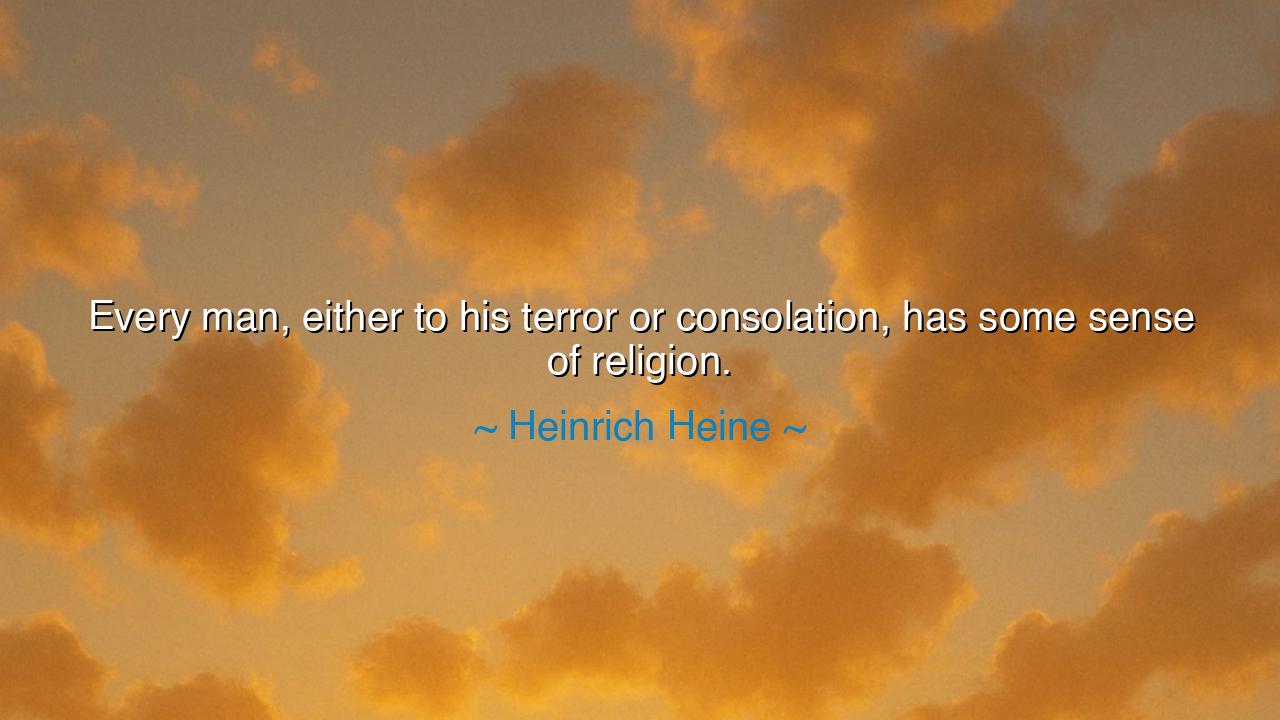
Every man, either to his terror or consolation, has some sense of






“Every man, either to his terror or consolation, has some sense of religion,” wrote Heinrich Heine, the German poet whose words carried both the music of faith and the anguish of doubt. In this single sentence, Heine captures the profound duality of the human spirit — that within every heart, whether believer or skeptic, there stirs an awareness of the divine, a whisper of something greater than the self. This awareness is both terror and consolation: terror, because it reminds us of our smallness and mortality; consolation, because it assures us that life is not merely chaos and dust. Heine, who lived through the storms of revolution and exile, knew that the soul cannot escape its yearning for meaning, even when it rebels against the heavens.
The origin of this thought arises from Heine’s own tumultuous life. Born Jewish in Germany, he later converted to Christianity for social acceptance, yet he never found peace in either camp. He wrestled with faith as Jacob wrestled with the angel — not to destroy it, but to understand it. In his poetry and prose, he mocked dogma but never mocked the mystery. He had seen the grandeur and hypocrisy of religion alike, and so his insight is not that of the pious or the profane, but of one who stands between the two, seeing that belief is a condition of being human. Whether we call it God, destiny, conscience, or truth, every person carries within them a sacred awareness — a silent dialogue with the infinite.
When Heine says “to his terror or consolation,” he reveals the two faces of this awareness. To some, the divine presence is comfort — the promise that love and justice extend beyond the grave. To others, it is dread — the reminder that nothing is hidden, that our deeds echo beyond the veil. Even the atheist who declares “there is no God” must wrestle with the void, must face the vast silence that mirrors the divine absence he denies. Thus, even in rejection, there is a kind of religion — the religion of struggle, the religion of the unanswered question. Heine understood that to feel awe, fear, or wonder before existence itself is to touch the hem of something holy.
Throughout history, humanity has lived by this paradox. Consider the story of Fyodor Dostoevsky, another man torn between doubt and devotion. Condemned to die by firing squad, he faced the terror of mortality, only to be spared at the last moment. In that instant, as he stood between death and life, he felt a fierce clarity — a sense that the divine was near, not in the thunder of miracles, but in the trembling of the soul. From then on, his writings burned with the same truth Heine spoke of: that every heart bears its own religion, whether it kneels before God or stands defiant in despair.
This inner sense of the sacred is the thread that unites all human beings. It appears in the peasant praying before dawn and in the philosopher gazing into the abyss; in the artist seeking beauty and in the scientist searching for order. Even the cynic, who laughs at faith, worships something — reason, power, art, or freedom. Heine saw this not as condemnation, but as revelation: that humanity is, by nature, religious. Not necessarily in creed or ritual, but in yearning — the longing to connect, to understand, to transcend. And this longing, whether it terrifies or consoles, is the very essence of being alive.
Yet Heine’s insight carries also a warning. For when man forgets this inner sense of the sacred — when he treats life as a machine and his soul as dust — he becomes restless, hollow, easily enslaved by lesser gods. The worship of gold, fame, or ideology replaces the worship of truth. The terror of losing meaning drives him to cling to false idols, while the consolation of genuine faith — faith in goodness, in love, in something greater — slips away. Thus, the wise must remember that religion, in its purest form, is not an institution but a heartbeat: the pulse of conscience, wonder, and reverence within every living soul.
So, dear listener, what lesson shall we draw from this? It is this: whether you find your religion in prayer, in art, in love, or in silence, honor it. Do not flee from the mystery that dwells within you, for it is both your humility and your strength. When the terror of existence overwhelms you, let that same awareness be your consolation — the knowledge that you are part of something vast, eternal, and luminous. Seek not to escape the divine, nor to define it too tightly, but to live in reverent dialogue with it.
And thus, as Heine teaches, remember: you may doubt, you may question, you may even despair — but you will never be without your sense of religion, for it is the light that flickers within all humanity. Tend to that flame gently, whether it burns bright or dim, for in it lies both the terror and the comfort of knowing you are more than flesh alone — you are a seeker of the sacred, walking beneath the eternal sky.






AAdministratorAdministrator
Welcome, honored guests. Please leave a comment, we will respond soon